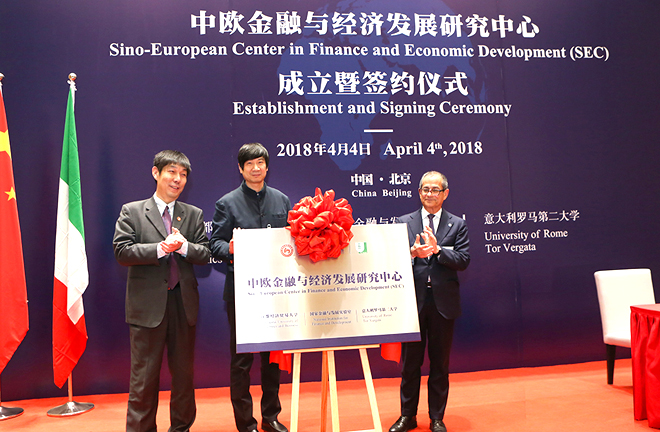Research center established to serve China-Europe financial cooperation

The unveiling ceremony of the Sino-European Center in Finance and Economic Development was held in Beijing on April 4.
The Sino-European Center in Finance and Economic Development was recently jointly established by the Capital University of Economics and Business (CUEB), the National Institution for Finance and Development (NIFD) and the University of Rome Tor Vergata in Beijing. Future opportunities for Sino-European financial cooperation drew the attention of the scholars participating in the establishment ceremony.
Emanuele De Maigret, economic counselor of the Italian Embassy to China, suggested that the new center will gather together academic talents from China and European countries to draw lessons from the development of China and Europe and contribute wisdom to the development of both.
Feng Pei, chairman of the University Council of CUEB, said that there is a good foundation for cooperation among CUEB, NIFD and the University of Rome Tor Vergata. The joint establishment of the new center was the result of cooperation among strong players. He proposed that the establishment of the new center should be viewed as a new starting point for pushing forward communication and cooperation between China and European countries. By doing this, the field and scale of cooperation can be expanded so that mutual benefit, win-win results and common development can be elevated to a higher level, Feng said.
Enrico Giovannini, a professor of economic statistics from the University of Rome Tor Vergata, elaborated on the role that universities and think tanks could play in leading the sustainable development of the world. Giovannini said that the world today is challenged by climate change and automation, and will also face unknown risks in the future. He suggested that universities and think tanks should take multiple and comprehensive measures to disseminate the idea of sustainable development and promote international cooperation.
Zhang Xiaojing, deputy director-general of the NIFD, delivered a keynote speech on the topic of “The National Balance Sheet of China and the Effects of Future Reforms.” Zhang suggested that the Chinese government has a strong ability to address potential risks. Improving the government’s ability to optimize the allocation of national resources will help to shield China from risks, improve efficiency and ensure the quality of development, Zhang said.
ZHAO YUAN is a correspondent with Chinese Social Sciences Today.
(edited by JIANG HONG)
